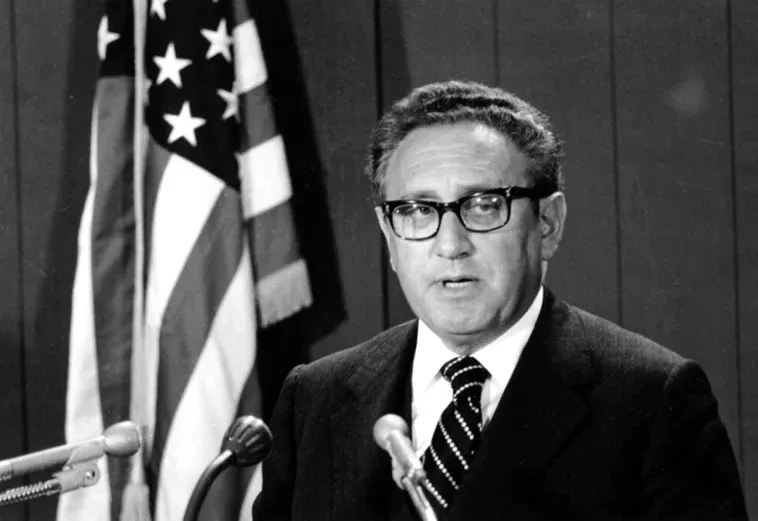(Washington Examiner)
Former Secretary of State Henry Kissinger, one of the most influential statesmen of the 20th century, has died at age 100.
Kissinger served as secretary of state under Presidents Richard Nixon and Gerald Ford from 1969 to 1977. While in the position, he played a central role in opening up relations with China, beginning detente with the Soviet Union, ending the war in Vietnam, assisting Israel during the 1973 Yom Kippur War, navigating through the OPEC oil embargo, and assisting authoritarian regimes in crushing communist movements worldwide.
Kissinger died at his home in Connecticut, according to Reuters.
“International stateman, lifelong scholar, skilled negotiator and architect of a lasting era of peace, stability, prosperity and global order — Dr. Kissinger’s impact on generations of citizens, from the U.S. to China, cannot be minimized,” his website stated in summarizing his legacy.

Henry Kissinger attends an event marking the 70th anniversary of the Marshall Plan for Germany and Europe in Berlin, Wednesday, June 21, 2017.
Markus Schreiber/AP
Until his death, Kissinger headed and actively participated in the business of his international consulting firm, Kissinger Associates Inc.
World War II interrupted his part-time enrollment at the City University of New York, with the naturalized citizen being drafted into the Army. His fluency in German earned him a job in counterintelligence, and in 1945, he received a Bronze Star. In civilian life following the war, Kissinger enrolled at Harvard University, where he got his bachelor’s and doctoral degrees.
He started consulting with the federal government while still in graduate school and went on to work with government officials and think tanks on foreign policy issues, including as foreign policy adviser to Nelson Rockefeller as he ran for president in 1960, 1964, and 1968. Kissinger was appointed national security adviser and later secretary of state by former President Richard Nixon and remained as secretary of state under former President Gerald Ford. There, he advocated detente with the Soviet Union, paved the way for the opening of China to the West, and spearheaded efforts toward U.S. withdrawal and ceasefire in Vietnam.
Kissinger received the Presidential Medal of Freedom in 1977 and the Medal of Liberty, given to foreign-born American leaders, in 1986. But it was the 1973 Nobel Peace Prize, awarded for his efforts to bring the Vietnam War to an end, that was regarded as controversial when it was awarded, and that Kissinger tried to return when the ceasefire failed. The top diplomat, an advocate of Vietnamization, heavily influenced the decision to bomb Cambodia to stop North Vietnam’s advance, a controversial choice that led to the death of approximately 150,000 Cambodians.
Kissinger’s ability to gain the trust of uncooperative foreign leaders such as Leonid Brezhnev, with whom he negotiated in the strategic arms limitation talks and the Anti-Ballistic Missile Treaty, led some to label him a foreign policy savant. But others have criticized him as a relentless political operative who would do anything to amass power and influence or accused him of crimes against humanity for his advocacy of U.S. intervention in South America and elsewhere.

President Richard Nixon listens to Kissinger, 1974.
AP






